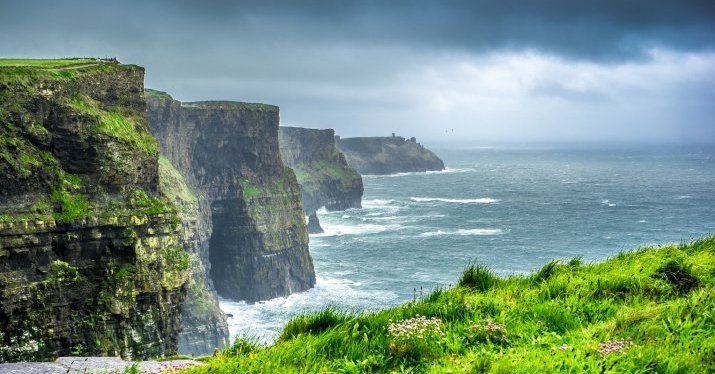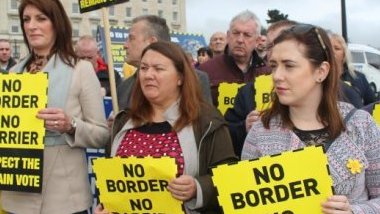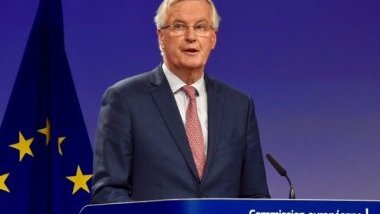The split of Ireland in a religious war context
After centuries of British domination dampened by regular uprisings and persisting animosity between protestant and catholic communities in the North, the British government decided to partition the island in 1922. The predominantly catholic counties of Leinster, Munster and Connaught were comprised in the Irish Free State, which was established as a British dominion. It became the State of Ireland in 1937, then the Republic of Ireland in 1949 when it was decided to leave the Commonwealth. In the North, the predominantly protestant Ulster county remains and integral part of the United Kingdom. Nevertheless, tensions remains omnipresent within Ireland. Northern Ireland Catholics never fully accepted the partition and face discrimination, especially in the world of work. On 5th October 1968, the Ulster police violently repressed a peaceful Catholic activists rally. That marked the beginning of a period of bloody conflicts. On one side, proreunification catholic groups took arms and multiplied violent acts of protests in the likeness of the Irish Republican Army (IRA). On the other side, protestant paramilitary groups responded in kind while the British government sporadically repressed catholic demands through violence. Meanwhile, free movement of citizens between Northern and Southern Ireland, originally preserved at the time of the split, was growing more and more restricted. Military checkpoints proliferated. [1]
Good Friday Agreement, base for a fragile peace
A peace agreement was finally signed on 10 April 1998 after three decades of violence and a 3500 death toll [2]: the Good Friday Agreement, named after the last Friday before Easter in the Christian liturgical calendar. Also called the Belfast Agreement, it laid the groundwork for the establishment of democratic institutions and representatives in Northern Ireland; the creation of a cross-border Ministerial Council between the two Irelands and of an Intergovernmental Council between the Republic of Ireland and the UK. More importantly, the military blockades were progressively removed and the four freedoms of movement prescribed by the EU were fully re-established in 2005. Yet, peace is fragile. Politic life in Northern Ireland is mainly divided between the Democratic Unionist Party (DUP) - in favour of maintaining Northern Ireland in the United Kingdom but historically hostile to the Good Friday Agreement – and the Sinn-Fein, a proreunification party supported by a catholic minority.
Brexit and the Irish border: an unsolvable equation?
At once, London was clear: the question of immigration within Europe and thus the free movement of people is the limit and the United Kingdom will only cease to apply once their departure for the EU is effective. EU’s position was also crystal clear: the four freedoms of movement are indivisible, therefore rejecting one of them would immediately deprive any State of their access to the Single Market. Secondly, the United Kingdom also rejects being part of the Customs Union which waive the application of customs duty on good at the border. However, according to the rules enforced by the EU, this would compel the UK to comply with European norms and legislations when it comes to the production of goods, as is the case for Turkey at the moment.
This would logically imply that there could not be any free movement of capital, goods, persons and services between the Republic of Ireland and Northern Ireland and that customs duty would have to be collected at the partition border, which would obviously jeopardise the Good Friday Agreement.
British and European negotiators have therefore made this a key point of discussions and they are committed not to negate the Agreement. Despite some progress, the Irish question remains the main sticking point of negotiations and could be the cause of failure to reach an agreement.
Technical solutions and backstop
On 8 December 2017, European and British negotiators reached an agreement on the principles to be respected by the potential resolution of the Irish border issue. [3] In a joint report, they establish that Northern Ireland will have to remain fully part of the UK’s Single Market without any additional impediment to trade and that there shall be no hard-border between the two Irelands.
In a nutshell, either the United Kingdom has to offer satisfying specific solution in order to avoid a physical border – such as the absence of border for certain goods (farming) and services (energy), but not for others which would be subjected to dematerialised custom controls through innovative technology. Or, Northern Ireland has to maintain a complete regulatory alignment with the EU’s Single Market and Customs Union. That implies that there are only two possible solutions: either keeping the United Kingdom as a whole in the Single Market, or only keeping Northern Ireland, which would then not be fully part of the British Market. This is the so-called “backstop solution”. The principles in question were confirmed when the withdrawal agreement project was adopted during the European Council of the 22 and 23 March 2018. [4]
However, specialists are increasingly sceptical that “technical solutions” would allow to avoid the establishment of a physical border in case Northern Ireland withdraws from the Single Market. [5] The backstop option therefore seems likes the most credible one. The issue is that Europeans and British do not have the same definition for it. Meanwhile, the clock is ticking: on 29th March 2019, the United Kingdom will officially leave the European Union. The two parties have nevertheless agreed on a transition period as a sort of status quo. This will only delay the issue which will pose itself once more in the exact same terms on the 31 December 2020 deadline of the transition period.
A new crisis for Northern Ireland?
In order to reach an agreement on Brexit, the question of Ireland must be addressed. Europeans have been clear on that point: “Nothing is agreed until everything is agreed”.
Yet, to this day, keeping the United Kingdom in the Single Market is not a viable option, as it would go against the very essence of what was promised during the Brexit campaign. It would force the UK to comply with all European rules and to contribute to the EU budget in similar conditions while not partaking in political decisions. Maintaining only Northern Ireland in the Single Market is not a viable option either. The majority in Parliament of British Prime Minister Theresa May rests on the support of 8 Northern-Irish unionists (DUP) members. Such a decision would undoubtedly result in bringing down her government and in new elections to be held, with an uncertain outcome. Even worse, even if a majority was found in London without the support from the DUP, nothing guarantees that Unionists won’t continue their fight in Northern Ireland.
Lately, some British pro-Brexit political figures have multiplied attacks against the Good Friday Agreement. [6] The peace process in Ireland is facing a very real danger. The Irish border is yet another reminder that peace is too often taken for granted and that the European Union is the best peacekeeper.






Follow the comments: |
|
